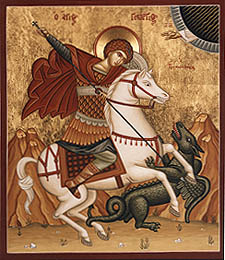1 Corinthians 8:1-13
 I am going to begin my sermon by saying something controversial. A shift of what is called “epic proportions” has been taking place over the last several generations in Western culture: the collapse of Christendom. Christendom is the Western culture that existed after the emperor Constantine made Christianity the official state religion of the Roman Empire in the fourth century. For the next several hundred years, Christianity spread, sometimes by mission and sometimes by conquest. The spread of Christianity was so effective that, even after the rise of Islam and the breaking up of the church in the Protestant Reformation, it was generally assumed in the Western world that almost everyone in the culture was in some sense Christian, even if they were not necessarily committed Church members. We see this in all kinds of ways that we don’t even think about. Our calendars are dated from the year that a sixth-century monk named Dionysius Exiguus placed the birth of Jesus, which became the normal way of dating in the Gregorian and Julian Calendars. Christmas and Easter are semi-official holidays even if some people think that the decorations on Starbucks cups are part of a “war on Christmas.” There are church buildings in most town centers, and states like Pennsylvania still have “blue laws” that place restrictions on such things as the selling of alcohol on Sundays. (You can now buy alcohol on Sunday in Pennsylvania, but apparently it is still illegal to sell an automobile or to hunt on Sunday.) Our money says “In God We Trust,” and even the New Atheists are very clear that the God they do not believe in is the Christian God. And, up until recently, most people identified themselves as belonging to some kind of Christian church – whether Protestant or Catholic.
I am going to begin my sermon by saying something controversial. A shift of what is called “epic proportions” has been taking place over the last several generations in Western culture: the collapse of Christendom. Christendom is the Western culture that existed after the emperor Constantine made Christianity the official state religion of the Roman Empire in the fourth century. For the next several hundred years, Christianity spread, sometimes by mission and sometimes by conquest. The spread of Christianity was so effective that, even after the rise of Islam and the breaking up of the church in the Protestant Reformation, it was generally assumed in the Western world that almost everyone in the culture was in some sense Christian, even if they were not necessarily committed Church members. We see this in all kinds of ways that we don’t even think about. Our calendars are dated from the year that a sixth-century monk named Dionysius Exiguus placed the birth of Jesus, which became the normal way of dating in the Gregorian and Julian Calendars. Christmas and Easter are semi-official holidays even if some people think that the decorations on Starbucks cups are part of a “war on Christmas.” There are church buildings in most town centers, and states like Pennsylvania still have “blue laws” that place restrictions on such things as the selling of alcohol on Sundays. (You can now buy alcohol on Sunday in Pennsylvania, but apparently it is still illegal to sell an automobile or to hunt on Sunday.) Our money says “In God We Trust,” and even the New Atheists are very clear that the God they do not believe in is the Christian God. And, up until recently, most people identified themselves as belonging to some kind of Christian church – whether Protestant or Catholic.
But this has been changing. Since World War II, fewer members of each generation have been identifying as Christian, and more and more identify as “unaffiliated ,” or “nones,” not spelled N-U-N-S, but N-O-N-E-S, as in “none of the above.” In recent surveys, 80% of the World War II Generation identify with some kind of mainstream Christian denomination: Roman Catholic, Evangelical, or mainline Protestant. Only 11% identify as “unaffiliated.” With the Baby Boomers, those numbers begin to shift, and the percentage of unaffiliated rises to 17%. For Generation X, 23% are “unaffiliated,” and, among “younger millenials,” 36% do not identify with any historic Christian tradition.1
All traditional Christian churches have lost membership, including both Evangelicals and Roman Catholics, but the group that has lost most is mainline Protestants, who account for 22% of the World War II Generation, but only 11% of Millennials. Significantly, “nones” are now the largest single group. While you’re more likely to be some kind of Christian than a “none” if you’re a millennial, you’re twice as likely to be a “none” as to be an Evangelical or a Roman Catholic, and you’re more than three times as likely to be a “none” than you are to be a mainline Protestant – a Lutheran, a Presbyterian, an Episcopalian or Anglican, a Congregationalist or a Methodist. Among millennials, while some raised in Christian traditions become “nones,” the reverse is seldom the case. Those who are raised with no religious affiliation whatsoever stay that way. Growing up in a home without any religion is a good way of never becoming a member of any religious group.
I had to say earlier that this post-Christendom claim is controversial because just yesterday several of my friends on Facebook pointed to a new study that indicated that versions of Christianity that attract seriously committed Christians are not shrinking. However, I don’t necessarily see a contradiction here. This could simply mean that the part of the population that was only nominally committed to Christian faith no longer sees the need to keep up the pretense.2 Regardless, it appears that with each upcoming generation, a larger percentage no longer identifies with historic Christian faith.
In the last five to ten years, there has been a kind of cottage growth industry of experts who are giving the church advice about how to survive in this new post-Christendom setting. For example, the Eastern Orthodox writer Rod Dreher last year published a book entitled The Benedict Option, in which Dreher argues that Christians need to recognize that the dominant culture is now hostile to Christian faith, and we need to create a kind of neo-monastic Christianity whose goal or purpose is to preserve and pass on the faith to the next generation in the midst of this hostility.3 Evangelical philosopher James K. A. Smith has written You Are What You Love, in which he argues that post-modern secularism ultimately cannot satisfy basic human needs and that Christians need to recover a liturgical and catechetical spiritual formation that will provide a life-giving alternative to secularism.4 While it might seem as if Dreher and Smith are on the same page, they have engaged in a rather public and nasty feud with one another recently with Smith strongly criticizing Dreher’s new book, and Dreher saying that Smith is just angry because he didn’t publish with Smith’s publisher.5
So how might committed Christians respond to this new situation? I would suggest that St. Paul’s letter to the Corinthians provides some very helpful advice. (more…)


